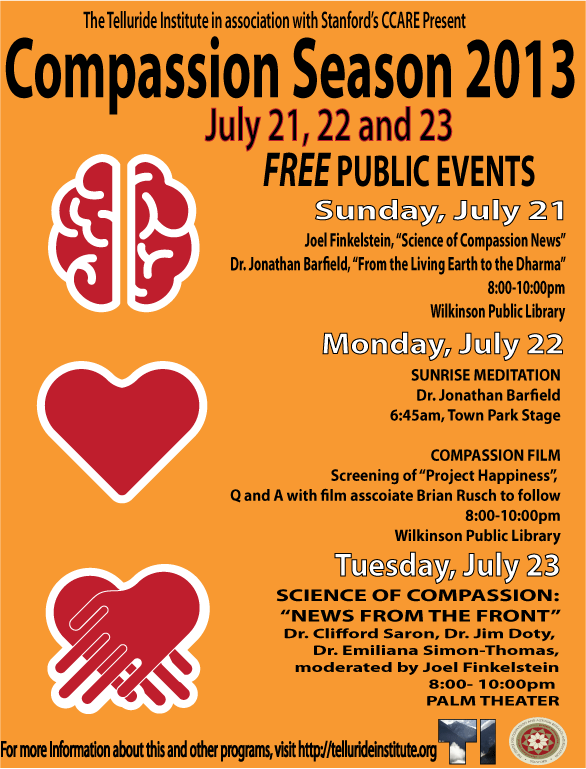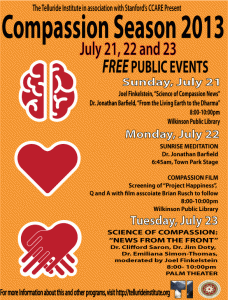
19 Jul Telluride Institute & Stanford: Signs of Compassion, News from the Front
 Dan Buettner was one of the many charismatic presenters at Mountainfilm in Telluride 2012. Buettner spoke twice at the event based on findings summed up in his two books: “The Blue Zone: Lessons for Living Longer from the People Who’ve Lived the Longest” and “Thrive: Finding Happiness in Blues Zones Way.”
Dan Buettner was one of the many charismatic presenters at Mountainfilm in Telluride 2012. Buettner spoke twice at the event based on findings summed up in his two books: “The Blue Zone: Lessons for Living Longer from the People Who’ve Lived the Longest” and “Thrive: Finding Happiness in Blues Zones Way.”
As far as longevity goes, Buettner says it’s “20 percent genes and 80 percent lifestyle.” Folks in Loma Linda, California; Sardinia, Italy; Nicoya, Costa Rica; Ikaria, Greece; and Okinawa, Japan; places old people thrive, are all living in environments that encourage constant and consistent natural movement like walking (no gonzo exercise). People living in these places have the right outlook on life: they live for now (not tomorrow and not to work) and know how to downshift. They eat wisely, which means a plant-based diet supplemented by meat (about three ounces) about five times a month washed down with a glass (or two) of wine. Most important, they value family (and families value their seniors), and share lots of face time with loved ones and close friends. Connection seems to be a sine qua non of longevity.
Pretty much the same holds true for happiness: interconnectedness is key. It’s all about survival of the kindest.
Buettner’s findings would be a giant DUH! to Dr. James R. Doty, who, along with his colleagues, is out to change the world one act of kindness at a time.
Dr. Doty is Professor of Neurosurgery at Stanford University School of Medicine and Founder/Director of the Center for Compassion and Altruism Research and Education, (CCARE), of which His Holiness the Dalai Lama is the founding benefactor. In that capacity, Dr. Doty collaborates with scientists across disciplines, examining the neural bases for compassion and altruism. In a blog in the Huffington Post (6/7/2012), Doty said this:
“Our poverty in the West is not that of the wallet but rather that of social connectedness. In this modern world where oftentimes both parents work, we are spending less time as a family. People are living farther away from extended families and perhaps more disconnected than ever before as suggested by Robert Putnam in “Bowling Alone.” Putman observes that we thrive under conditions of social connection but that trust and levels of community engagement are on the decline. Loneliness is on the rise and is one of the leading reasons people seek counseling… One large-scale study showed that lack of social connectedness predicts vulnerability to disease and death above and beyond traditional risk factors such as smoking, blood pressure, obesity and lack of physical activity. While many pay attention to their diet and go to the gym regularly to improve their health, they don’t think of social connectedness this way. Just like physical fitness, compassion can be cultivated and maintained.”
For the 4th year in a row, the Telluride Institute partnered with Doty and his Stanford University’s CCARE, (Center for Compassion and Altruism Research and Education), for a “Science of Compassion Summer Research Institute.” From Saturday, July 20 – Friday, July 26, the world’s most respected scientists and researchers on mindfulness, compassion and altruism are in Telluride to advance research through collaboration, dialog, inquiry, and education.
Drawing from several disciplines including neuroscience, psychology, genetics, economics, and contemplative traditions, the CCARE Summer Research Institute (SRI) aims to examine compassion, altruism and prosocial behavior from a wide perspective of scientific angles. In particular, the SRI will explore and discuss the neural correlates, biological bases and antecedents of compassion; the effects of compassion on behavior, physiology, overall health, and the brain; and methods, techniques, and programs for cultivating compassion and promoting altruism within individuals and society-wide. Compassion education programs will also be integrated into the curriculum.
The long-term goal of the SRI is to support young scientists who hope to focus their research on compassion, altruism, and prosocial behavior. Their participation in the Institute will allow them to deepen their knowledge of compassion research, receive training in compassion education and research programs, build collaborations, and develop a network of like-minded scientists that can offer intellectual support and community. The SRI will award competitive pilot research grants to outstanding participants whose research protocols promise to significantly further the field of compassion research.
Because the Science Research Institute is largely a private conference between professors and graduate students who have made it through the narrow sieve of the application pool, the Telluride Institute is also sponsoring a series of complementary FREE events for the public that will shed some light on recent developments and directions in the field of compassion and altruism research.

Dr. James R. Doty
The free events take place Sunday, July 21, Monday, July 22, and Tuesday, 23, as follows:
On Sunday, July 21, there will be two talks at the Wilkinson Library. Joel Finkelstein will provide an “Overview of Science of Compassion News and Research” and Dr. Jonathan Barfield will offer an experiential presentation that carries compassion from the prosocial mind to the proenvironmental mind. The title of the talks is “From the Living Earth to the Dharma: 4 Thoughts That Turn the Mind To Living in Right Relationship” and they begin at 8 p.m. with a discussion to follow.
Monday morning, July 22, Barfield conducts a Sunrise Meditation on the Town Park Stage, 6: 45 a.m.
Monday evening, July 22, a “Compassion Film” is scheduled to be screened at the Wilkinson Public Library, with discussion to follow, 8 – 10 p.m.
On Tuesday, July 23, a culminating panel discussion at the Palm Theater, “The Science of Compassion: News from the Front” features distinguished professors and researchers Dr. Clifford Saron (Center for Mind and Brain, UC Davis), Dr. Emiliana Simon-Thomas (The Greater Good Science Center, UC Berkley) and Doty. The event will be moderated by Finkelstein and runs from 8 – 10 p.m.
The emerging science of compassion is a deeply applicable area of study if we are to re-imagine our world as a place of tolerance, peace, and kindness for all beings.
For a preview of the big talk at the Palm, click the “play” button and listen to my conversation with Dr. Doty about his life and work.


Sorry, the comment form is closed at this time.